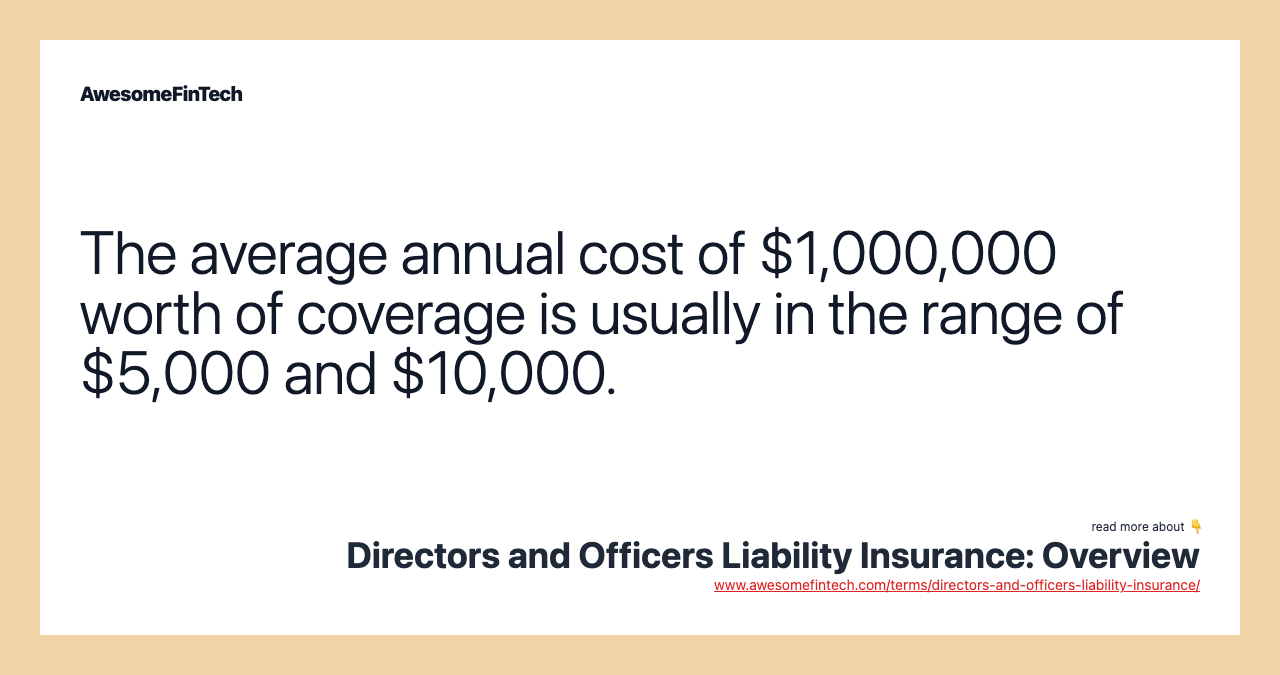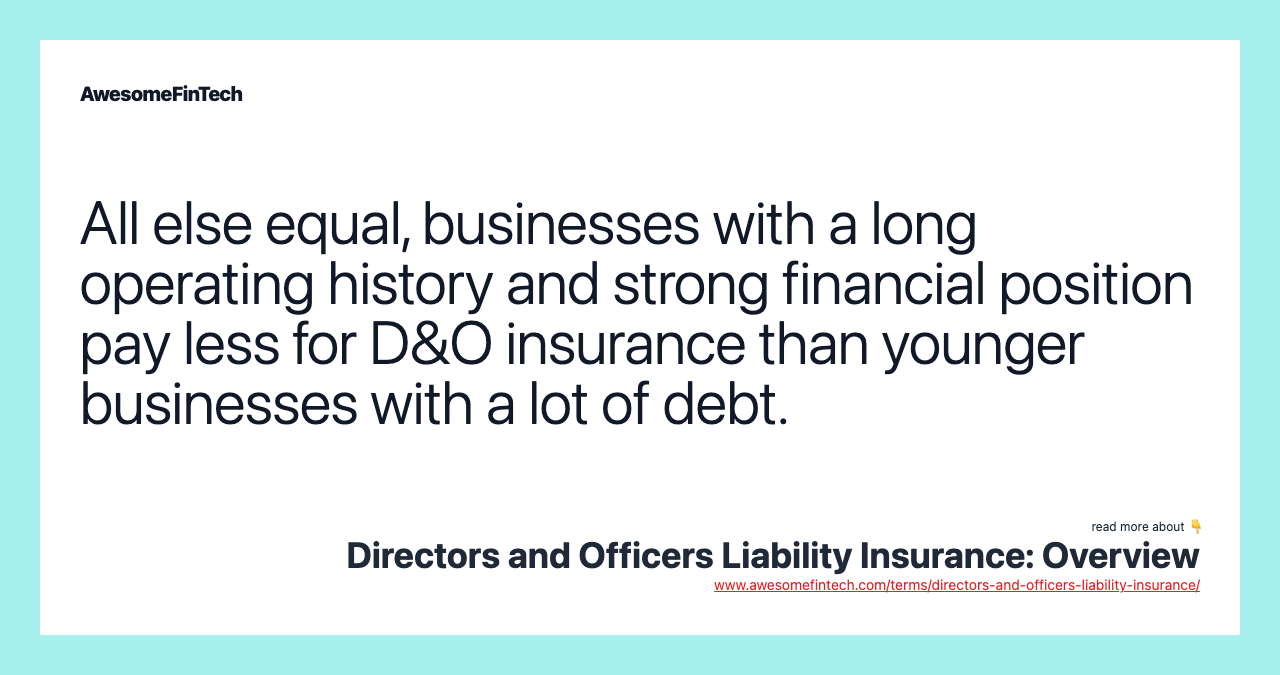Directors and Officers Liability Insurance: Overview
Table of Contents What is Directors and Officers Liability Insurance (D&O)? A few of the main reasons companies don't buy D&O insurance include: The belief that it's unnecessary because their business is privately held They haven't experienced a suit in the past The belief that it's unnecessary because their business is family-owned Small companies are particularly vulnerable to a potentially damaging lawsuit because they don't have the financial muscle that larger companies may have. The cost of D&O insurance can vary widely depending on factors like company size, industry, risk appetite, financial position, revenue, and claims history. All else equal, businesses that have a long operating history will likely pay less than younger organizations. D&O insurance has become closely associated with broader management liability insurance, which covers liabilities of the corporation, as well as the personal liabilities for the directors and officers of the corporation. D&O policies can take different forms, depending on the nature of the organization and the risks it faces. Special Considerations D+O Insurance FAQs Directors and officers (D&O) liability insurance is insurance coverage intended to protect individuals from personal losses if they are sued as a result of serving as a director or an officer of a business or other type of organization. They're commonly referred to as Side A, Side B, and Side C. Side A coverage covers directors and officers for claims where the company refuses to or is financially unable to pay for indemnification.

What Is Directors and Officers Liability Insurance (D&O)?
Directors and officers (D&O) liability insurance is insurance coverage intended to protect individuals from personal losses if they are sued as a result of serving as a director or an officer of a business or other type of organization. It can also cover the legal fees and other costs the organization may incur as a result of such a suit.








Understanding Directors and Officers Liability Insurance (D&O)
D&O insurance applies to anyone who serves as a director or an officer of a for-profit business or nonprofit organization. A D&O insurance policy insures against personal losses, and it can also help reimburse a business or nonprofit for the legal fees or other costs incurred in defending such individuals against lawsuits.
D&O insurance claims are paid to directors and officers of a company or organization for losses or reimbursement of defense costs if legal action is brought against them. Such coverage can also extend to criminal and regulatory investigations or trial defense costs. Civil and criminal actions are often brought against directors and officers simultaneously.
D&O insurance is akin to corporate governance, corporate law, and the fiduciary duty owed to stakeholders, such as shareholders and beneficiaries. US federal law grants directors and officers broad discretion in their business activities. Corporate law is typically handled at the state level. Publicly traded companies are subject to more federal regulation than privately held companies, particularly due to the Securities Act of 1933 and the Securities Exchange Act of 1934.
Types of Directors and Officers (D&O) Liability Insurance
The typical D&O insurance policy contains three types of insuring agreements. They're commonly referred to as Side A, Side B, and Side C.
Side A coverage covers directors and officers for claims where the company refuses to or is financially unable to pay for indemnification. This can occur, for example, if the company has declared bankruptcy. Under Side A coverage, the individual officer is the one who's insured and it's their personal assets that are at risk.
Side B coverage covers the losses of directors and officers when the company does grant indemnification. In this case, the policy will reimburse the company for legal costs. Under Side B coverage, it is the company that is insured while its corporate assets are at risk.
Side C coverage, also called "entity coverage," extends coverage for the corporate entity itself. Under Side C coverage, the company is insured and its corporate assets are at risk.
The exact coverage that a company goes with ultimately depends on its unique business model characteristics, needs, history, and financial picture.
Directors and Officers (D&O) Liability Insurance Process
The process of D&O insurance in real life is straightforward. It all starts when a manager allegedly fails to perform his or her role. Some common risk scenarios include employment malpractice, reporting errors, inaccurate disclosures, insolvencies, and regulation violations. As a result, several claimants decide to sue the manager.
Once the manager and the legal/risk management departments are informed of the claim, they then provide a description of the claim to their broker/insurer. If the claim is covered, the insurer covers the defense costs. If the claim is covered and the case is lost, the insurer pays for the defense costs and the financial losses.
Of course, that example heavily depends on the terms and conditions of the specific policy.
Management Liability Insurance
D&O insurance has become closely associated with broader management liability insurance, which covers liabilities of the corporation, as well as the personal liabilities for the directors and officers of the corporation.
Special Considerations
D&O policies can take different forms, depending on the nature of the organization and the risks it faces. It’s best to seek out an insurance company with deep experience in this specialized field. The policies are generally purchased by the organization to cover a group of individuals rather than by the individuals themselves.
If a company fails to disclose material information or willfully provides inaccurate information, the insurer may avoid payment due to misrepresentation.
The "severability clause" in the policy conditions may be intended to protect against this by preventing misconduct by one insured from affecting insurance for other insureds; however, in certain jurisdictions, it may be ineffective.
Policies can be written to insure against a variety of hazards, but they generally make exclusions for fraud, criminal activity, and illegal profits. Also, most policies contain "insured vs. insured" clauses, whereby no claim is paid when current or former directors and officers sue the company. This prevents the company from profiting from deceit or conspiracy.
D+O Insurance FAQs
Do I Need D+O Insurance?
It depends on the size and nature of your business. But generally speaking, D&O insurance should seriously be considered.
In fact, a 2016 study by Chubb showed that more than 25% of private companies reported a D&O loss over the span of three years.
Notably, 96% of those companies were negatively impacted financially. For the companies that didn't purchase D&O insurance, the average loss was a whopping $390 thousand. Moreover, companies of all sizes and industries suffered D&O losses, including healthcare companies, manufacturers, retailers, and many more.
So while D&O insurance isn't necessary for every single business, in every situation, it's fair to say that any company with a board of directors would be wise to buy some D&O insurance.
Do Small Businesses Need D+O Insurance?
Small businesses aren't immune to costly lawsuits. It might be easy to assume that lawsuits and fines are only triggered by disgruntled shareholders. That's definitely the case with high-profile suits against large public companies.
However, Chubb's data shows that for private companies, the most damaging suits are brought by customers, vendors, and other third parties.
A few of the main reasons companies don't buy D&O insurance include:
Small companies are particularly vulnerable to a potentially damaging lawsuit because they don't have the financial muscle that larger companies may have.
How Much Does D+O Insurance Cost?
The cost of D&O insurance can vary widely depending on factors like company size, industry, risk appetite, financial position, revenue, and claims history.
All else equal, businesses that have a long operating history will likely pay less than younger organizations. Also, companies with a strong financial position (lower bankruptcy risk) will also pay less, generally speaking.
That said, the average annual cost of $1,000,000 worth of coverage is usually in the range of $5,000 and $10,000.
What Type of D+O Insurance Should I Buy?
Once again, the type of D&O insurance you choose depends on what your company needs and what it can afford. Here are a few main things to consider:
It's also important to identify whether the D&O policy you're buying is a "duty to indemnify" or "duty to defend" policy.
Under an indemnity policy, the company can choose its own legal defense team. The insurer will then reimburse the company for the defense costs as long as they deem the price "reasonable." On the other hand, the insurer is responsible for defending the company under a duty to defend policy.
Generally speaking, a duty to defend policy is preferable for smaller companies because the process is streamlined, hassle-free, and all the defense costs are covered.
What Does D+O Insurance Cover?
D&O insurance typically covers legal fees, settlements, and financial losses when the insured is held liable. Common allegations covered include breaches of fiduciary duty, failure to comply with regulations, lack of corporate governance, creditor claims, and reporting errors.
Outright fraud, criminal activity, and lawsuits between managers within the same company are usually not covered.
Related terms:
Bankers Professional Liability – BPL Insurance
Bankers professional liability (BPL) insurance is financial protection for banking industry professionals against customers’ claims of wrongdoing. read more
Business Legal Expense Insurance – LEI
Business legal expense insurance (LEI) is a policy that provides coverage for expenses that a business may incur from lawsuits. These costs may include fees for lawyers, witness expenses, court fees, or even the cost to hire expert witnesses. read more
Corporate Reimbursement Coverage
Corporate reimbursement coverage protects a company against losses resulting from legal action against its directors and officers. read more
Employers' Liability Insurance
Employers' liability insurance covers businesses against claims by employees who have suffered a job-related injury or illness, or who file lawsuits. read more
Liability Insurance
Liability insurance provides the insured party with protection against claims resulting from injuries and damage to people and/or property. read more
Securities Exchange Act of 1934
The Securities Exchange Act of 1934 was created to govern securities transactions on the secondary market and ensure fairness and investor confidence. read more
Securities Act of 1933
The Securities Act of 1933 is a piece of federal legislation enacted as a result of the market crash of 1929. read more
Weather Insurance
Weather insurance offers financial protection against losses incurred by adverse, measurable weather conditions. read more